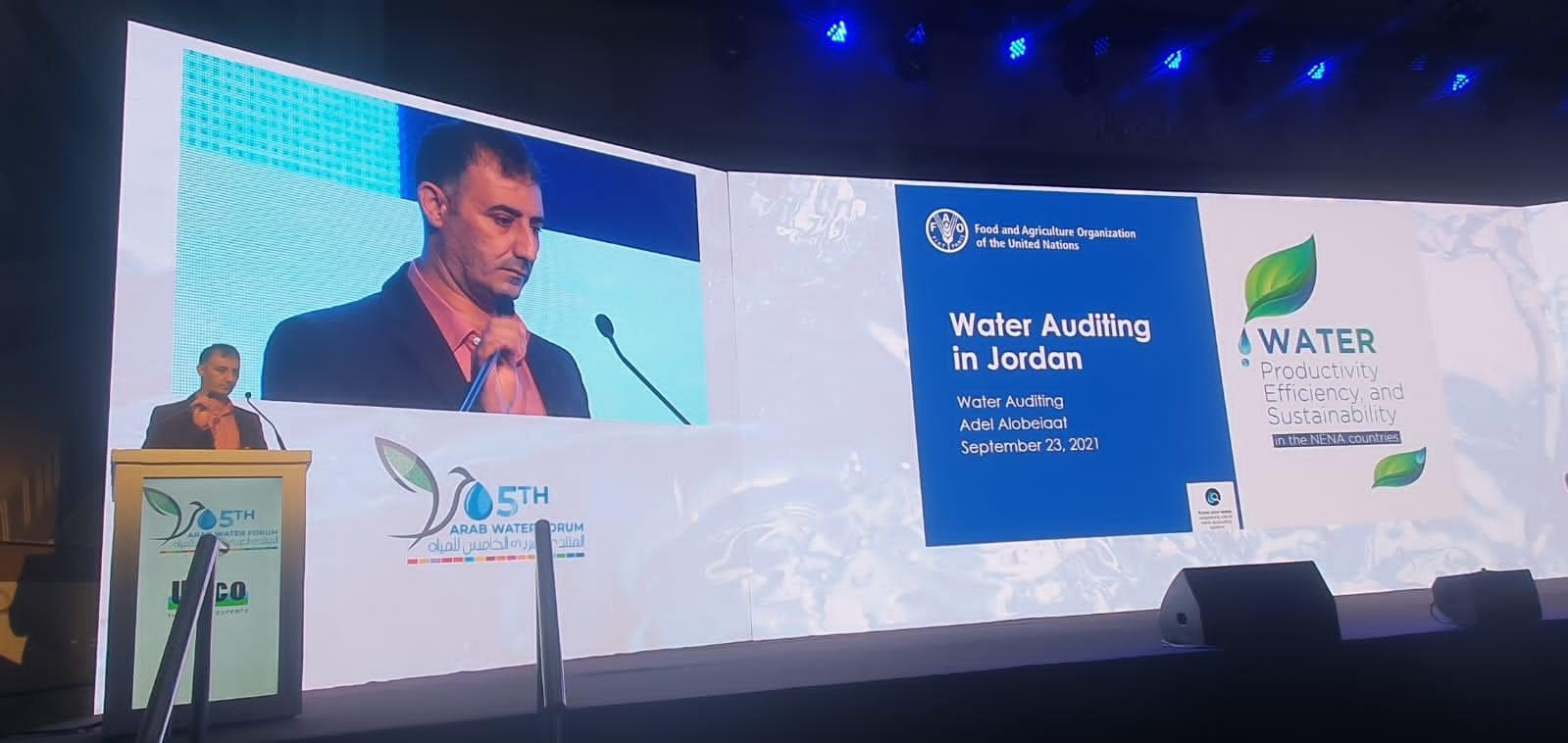FAO discusses water accounting and auditing at the fifth Arab Water Forum

September 2021 – Ensuring sustainable and reliable allocation of water while protecting water quality and sustainability has become increasingly complex and problematic in many regions of the world and in particular the Near East and North Africa (NENA) region. To support this, it is important to have evidences on the status and evolution of water resources, their uses and users, whether at the local, national, or transboundary level and understanding its governance context (water governance analysis also called water auditing). This is the key purpose of using water accounting and auditing.
First practical lessons on what can be learnt from water accounting and auditing were shared at the fifth Arab Water Forum organized in Dubai from 21 to 23 September 2021, gathering high level professionals, and decision makers. The Food and Agriculture Organization of the United Nations (FAO) in collaboration with the International Water management Institute (IWMI) organized a regional session under the title: Regional Water Accounting and Auditing. The session shared and reflected on the implementation and piloting of the water accounting and governance (water auditing) analysis. Many participants attended the session physically and virtually, whom included representatives from multiple sectors and countries.
The session shed light on various case studies and captured lessons learned from both Jordan and Lebanon whom are currently piloting the FAO water governance analysis methodology, as well as from other countries around the world on similar approaches. The session allowed for participation from participants through social media tools to provide feedback on what they heard. An introduction on the concepts and approaches of water accounting and auditing from the FAO WEPS-NENA project was provided by Adham Badawy, research officer, IWMI.
The experience shared by the countries revealed the usefulness of applying the systematic assessment approaches such as water accounting and auditing. The approach allows for a better understanding the key water management issues, the causes behind problems, and can guide trade-offs decisions for the most appropriate priority of actions and interventions that address those issues.
Both Lebanon and Jordan indicated that they face challenges in conducting the water Governance Analysis (WGA). Mr Adel Abiedat, from the Ministry of water resources and irrigation in Jordan highlighted “one of the initial challenges is to get the necessary stakeholder engagement on board to bring in the different perspectives and interests (inside water institutions and outside)”. Ms Mona Fakih, Director of Water, General Directorate of Hydraulic and Electric Resources, Ministry of Energy and Water- Lebanon added “Political will, financial stability and information availability are also limiting factors and constraints for implementing water auditing and diving in deeper levels of analysis”. Both country representative insisted that it takes time, but is relevant and that WGA needs to be embedded within and ensure compatibility with values, social structures and processes. Dr. Amgad Elmahdi, Regional director of IWMI-MENA, reviewed a series of example from around the world including Tunisia, South America, Tanzania and Australia on water governance assessment and showed that these process are complex and need to be implemented over significant time to reach results-before during and after- and build ownership over them to lead to actions.
In the Panel discussed, his Excellency Mr. Jihad Saleh, Secretary General of the Ministry of water and Irrigation in Jordan, insisted on the fact that governance requires going beyond government, and consider the appropriate scale of intervention. He also indicated that water should be managed as an economic public good with appropriate and systematic information basis such as what “water accounting and auditing” can provide. Such a process would benefit from establishing independent regulators. Ms. Nafn Amdar from IWMI- Jordan shared the experience of a 3 years project on using water accounting at field level and how it helped farmers themselves realise that they were using too much water and change attitudes. Ms Domitille Vallée, Chief Technical Advisor, FAO-Near East and North Africa, insisted on the importance of building human capacities and establishing multidisciplinary water accounting and auditing teams at country level. Those teams include producers and analysts and they need to learn by doing considering the countries specificities while considering economic, financial, social, environmental and political issues in a transparent manner.
This activity is implemented within the framework of FAO’s regional project WEPS-NENA “Implementing the 2030 Agenda for water efficiency/ productivity and water sustainability in the NENA countries” under the Water Scarcity Initiative. ). One of the main objectives of the project is to strengthen the capacity in the region and at the country level to develop, institutionalize and operationalize Water Accounting and Water Auditing to inform water management and strategic planning of water allocation in the target countries. This project is funded by the Swedish International Cooperation and Development Agency.
